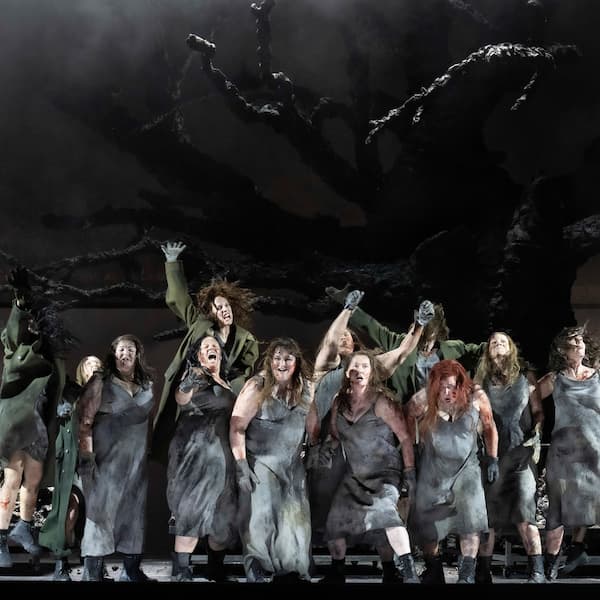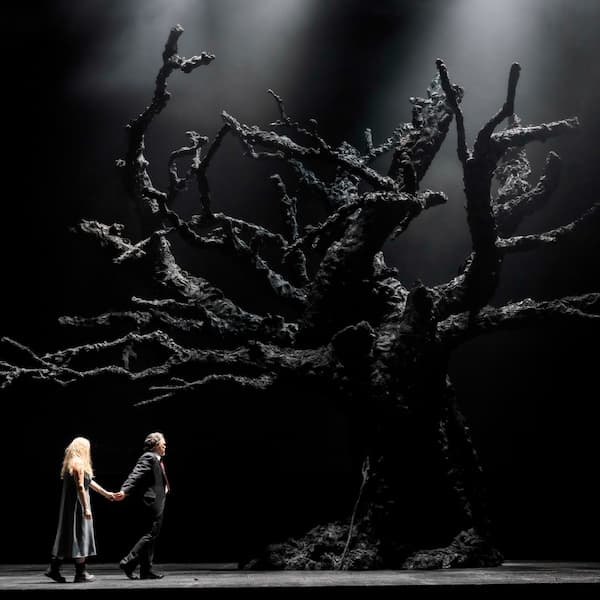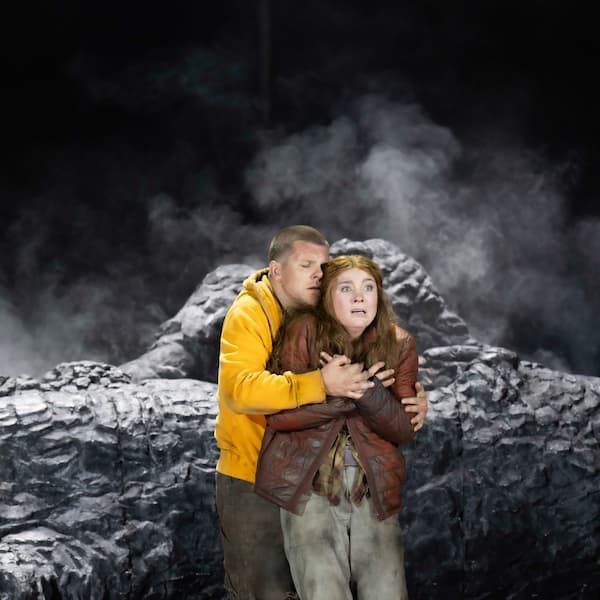The second opera of Richard Wagner’s Ring des Nibelungen, Die Walküre, is the most frequently performed of the cycle and contains some of the best-known music. Nevertheless, it demands directorial genius, musical finesse, as well as top-tier singers to bring this epic opera to life. The Royal Opera House’s new production succeeded on all counts.

Alison Kettlewell as Rossweisse, Catherine Carby as Siegrune, Claire Barnett-Jones as Waltraute, Katie Lowe as Ortlinde, Lee Bisset as Gerhilde, Maida Hundeling as Helmwige, Monika-Evelin Liiv as Grimgerde, Rhonda Browne as Schwertleite © 2025 Monika Rittershaus
Coming a year and a half after Australian director Barrie Kosky’s well-received Rheingold, his Walküre seamlessly connects with his earlier interpretative ideas. Again, the story is thematically held together by the earthmother Erda, who seems to take an ever more active role, covering her eyes in despair, touchingly holding the flowers for the lovers in the first act, and chillingly emerging as the bloody grip holding Siegmund’s sword. The presence of the stark-naked old woman (Clara Almond in this performance – kudos to her stamina and body-positive confidence), which shocked the audience in Rheingold, has now become a familiar, almost comforting and reassuring constant.
Rufus Didwiszus returned as the set designer, picking up the theme of postapocalyptic ecological disaster. He again used the central charred tree trunk, deployed blackened wooden walls and a dead tree to house Erda and finally, as the tree sheltering Brünnhilde where she is condemned by her father to mortal sleep. The final scene with Loge’s fire was simply spectacular.

Elisabet Strid as Brünnhilde and Christopher Maltman as Wotan © 2025 Monika Rittershaus
The star-crossed lovers and – yes – siblings of Siegmund and Sieglinde opened the opera with a bang. French tenor Stanislas de Barbeyrac, a young, confused and lost young man wearing a dirty hoodie, charged into his role with his meaty, warm and reassuringly robust tenor, effortlessly delivering his bone-tingling Wälserufe while resting on his knees. The chemistry with his Sieglinde, Natalya Romaniw, was explosive. Replacing the much-anticipated Lise Davidson, the Welsh-Ukrainian soprano was a revelation. Young and in love, her Sieglinde was a fully-fledged character, and her voice nothing short of arresting, with beauty, heft and blading top notes. Sieglinde’s husband Hunding was chillingly portrayed by Soloman Howard, who brought gravitas and menacing physicality to the role.
Christopher Maltman resumed his Wotan with very human foibles and problems, appearing as a business suit-wearing father of the Gods; the single contact lens depicting his one-eyed status was probably not visible to most of the audience. Die Walküre provides some of Wotan’s most important musical moments, and Maltman’s rich baritone fully rose to the occasion, covering all shades from warm and caring to threatening and finally to sorrowful. The English baritone’s impeccable diction and sonorous voice make him one of the most appealing and convincing Wotans of his generation.
He was again matched with Marina Prudenskaya as his spoiled, demanding and haranguing wife Fricka. The Russian mezzo-soprano clearly relished the role, deliciously flicking her hair while dispatching her music. It was easy to forget that Fricka actually has a fair point: incest isn’t a nice thing to witness, especially as the Goddess of marriage.

Stanislas de Barbeyrac as Siegmund and Natalya Romaniw as Sieglinde © 2025 Monika Rittershaus
Elisabet Strid tore into the role of Brünnhilde, skilfully tackling the emotional arc from a fun-loving favourite daughter to outcast pariah. A subtle though never underpowered voice of tremendous distinction. One looks forward to hear Strid’s big moments in Götterdämmerung in two years’ time.
Antonio Pappano, now Conductor Laureate of the Royal Opera but clearly still a wildly popular guest, brought contour to the music, shying away from the brassy pomposity so often heard in this opera, and never overpowering the singers. He held his orchestra back for the Ride of the Valkyries, making it subtly exciting, giving the Valkyries themselves the chance to let rip on stage, which they did with enthusiasm. Aggressive, fervent and thirsty for cadavers that turned to dust and earth in their clutch, these Valkyries devoured the stage, making no secret of their readiness to vocally cover any of the lead female roles.
It will be hard for Wagnerians to hold their breath until Pappano and Kosky return with Siegfried.
Performance attended: May 4, 2025
For more of the best in classical music, sign up for our E-Newsletter

